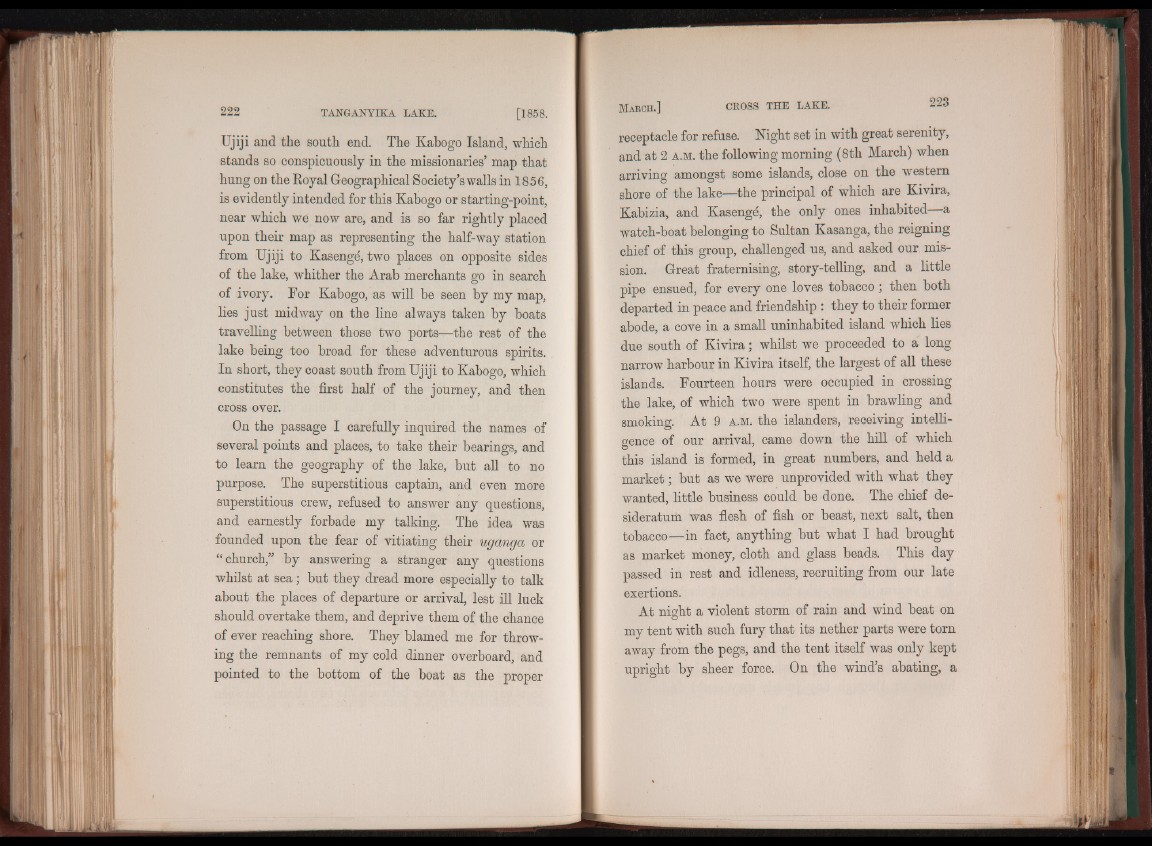
Ujiji and the south end. The Kabogo Island, which
stands so conspicuously in the missionaries’ map that
hung on the Royal Geographical Society’s walls in 1856,
is evidently intended for this Kabogo or starting-point,
near which we now are, and is so far rightly placed
upon their map as representing the half-way station
from Ujiji to Kasengd, two places on opposite sides
of the lake, whither the Arab merchants go in search
of ivory. For Kabogo, as will be seen by my map,
lies just midway on the line always taken by boats
travelling between those two ports—the rest of the
lake being too broad for these adventurous spirits.
In short, they coast south from Ujiji to Kabogo, which
constitutes the first half of the journey, and then
cross over.
On the passage I carefully inquired the names of
several points and places, to take their bearings, and
to learn the geography of the lake, but all to no
purpose. The superstitious captain, and even more
superstitious crew, refused to answer any questions,
and earnestly forbade my talking. The idea was
founded upon the fear of vitiating their uganga or
“ church,” by answering a stranger any questions
whilst at seai but they dread more especially to talk
about the places of departure or arrival, lest ill luck
should overtake them, and deprive them of the chance
of ever reaching shore. They blamed me for throwing
the remnants of my cold dinner overboard, and
pointed to the bottom of the boat as the proper
receptacle for refuse. Night set in with great serenity,
and at 2 A.M. the following morning (8th March) when
arriving amongst some islands, close on the western
shore of the lake—the principal of which are Kivira,
Kabizia, and Kasengd, the only ones inhabited—a
watch-boat belonging to Sultan Kasanga, the reigning
chief of this group, challenged us, and asked our mission.
Great fraternising, story-telling, and a little
pipe ensued, for every one loves tobacco ; then both
departed in peace and friendship : they to their former
abode, a cove in a small uninhabited island which lies
due south of K iv ira ; whilst we proceeded to a long
narrow harbour in Kivira itself, the largest of all these
islands. Fourteen hours were occupied in crossing
the lake, of which two were spent in brawling and
smoking. At 9 A.M. the islanders, receiving intelligence
of our arrival, came down the hill of which
this island is formed, in great numbers, and held a
market; but as we were unprovided with what they
wanted, little business could be done. The chief desideratum
was flesh of fish or beast, next salt, then
tobacco—in fact, anything but what I had brought
as market money, cloth and glass beads. This day
passed in rest and idleness, recruiting from our late
exertions.
At night a violent storm of rain and wind beat on
my tent with such fury that its nether parts were torn
away from the pegs, and the tent itself was only kept
upright by sheer force. On the wind’s abating, a